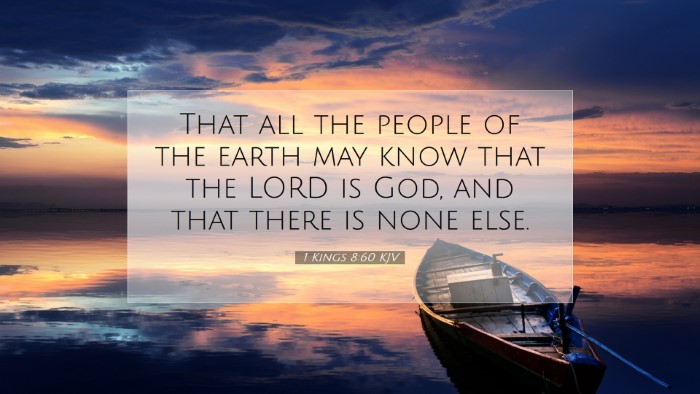Commentary on 1 Kings 8:60
Verse Context: 1 Kings 8:60 states, “So that all the peoples of the earth may know that the Lord is God; there is no other.” This verse is part of Solomon's dedication of the Temple in Jerusalem, where he acknowledges the significance of God's presence among His people.
Historical Significance
This verse highlights the purpose of the temple’s construction and the central message of the Israelite faith. The dedication ceremony described in 1 Kings 8 serves as a pivotal point in Israel's history where Solomon, following his father David’s plans, fulfills the dreams of establishing a dwelling place for God.
Theological Insights
Universal Knowledge: The phrase “all the peoples of the earth” indicates God's desire not just for Israel but for all nations to recognize Him as the one true God. This reflects the global scope of God's plan for salvation.
Exclusivity of God: The declaration “there is no other” emphasizes the monotheistic belief that is foundational to the Hebrew faith. The affirmation that the Lord is God sets a contrast against the polytheistic cultures surrounding Israel.
Commentary Excerpts
Matthew Henry's Commentary
Matthew Henry draws attention to the solemnity of the moment when Solomon stands before the congregation. He emphasizes the importance of acknowledging God’s sovereignty not only in the lives of the Israelites but also in the world. Henry remarks on the mission of Israel to be a light to the nations, showing that God's primary purpose is for the universal recognition of His divinity.
Albert Barnes' Notes on the Bible
Albert Barnes elaborates on the grandeur of the Temple and its role as a house of prayer for all nations. He highlights how Solomon’s prayer at the dedication includes petitions for foreigners, signifying the open invitation to all to seek God. Barnes notes that the verse encapsulates the core calling of the Divine to draw all mankind to Him, reinforcing the understanding of God as the universal Lord.
Adam Clarke's Commentary
Adam Clarke provides insight into the moral and spiritual implications of this verse. He discusses how the acknowledgment of God's sovereignty leads to a transformation in individuals and communities. Clarke recognizes that this proclamation serves as a reminder for the people of Israel and for us today that to know God is central to fulfilling our purpose and understanding our identity.
Applications for Today
- Missionary Mandate: This verse inspires a missionary spirit among believers, highlighting the importance of sharing the gospel with the world.
- Unity of Believers: By recognizing that there is only one God, the Church can unite beyond cultural and denominational differences.
- Encouragement for Prayer: The temple was a place of prayer, reminding believers of the importance of dedicating space and time for communion with God.
Conclusion
In 1 Kings 8:60, Solomon's words resonate beyond the physical establishment of the Temple. They encapsulate the heart of God's revelation to humanity. This verse invites all to recognize the uniqueness of the Lord, the God of Israel, as the sole source of truth and hope. For theologians, students, and pastors alike, this passage serves as a crucial reminder of the global mission of the Church and the call to testify to God's nature as revealed through Jesus Christ.


